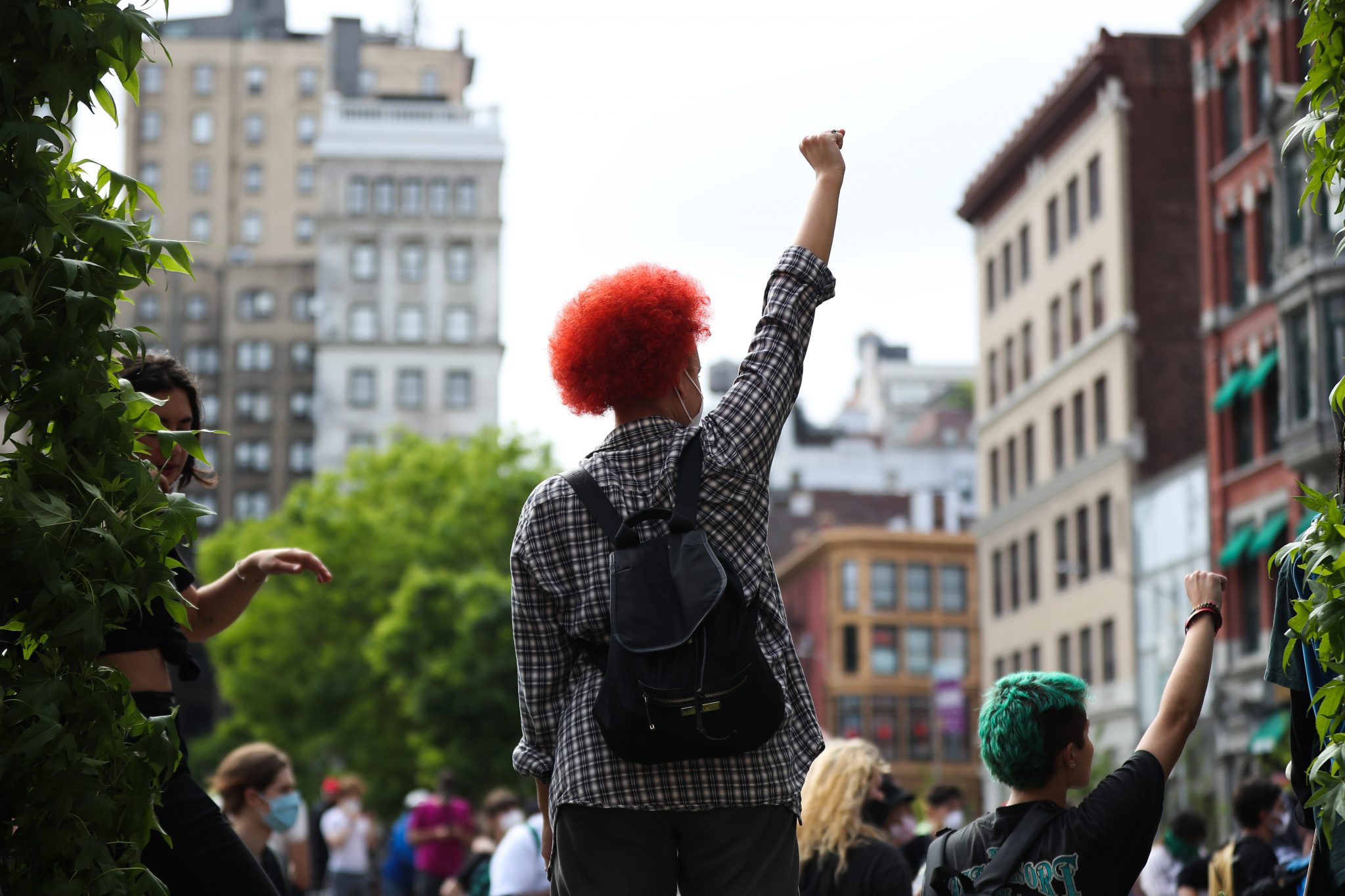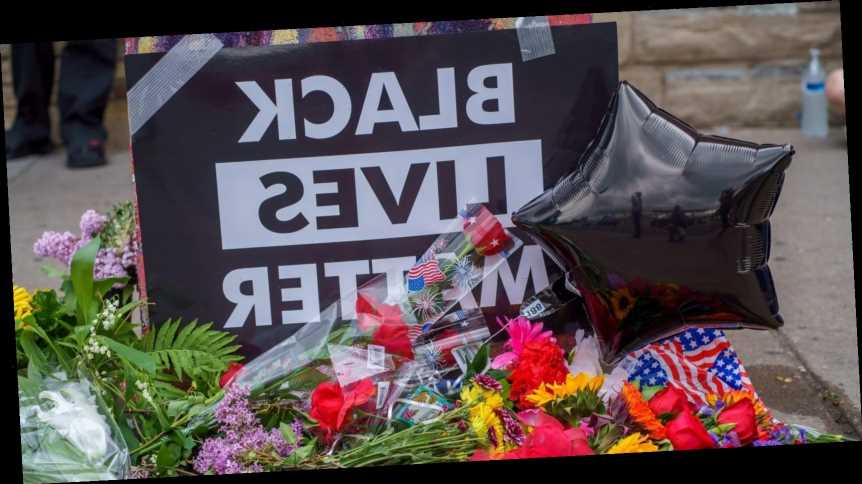Written by Jazmin Kopotsha
George Floyd is a black man who was killed by a white police officer in America on Monday 25 May. Stylist’s deputy digital editor Jazmin Kopotsha explains why she’s struggling to mourn the senseless killing of her community on social media, despite the desperate need for increased awareness.
How do you come to terms with the continued persecution of your own community? How do you quantify the black lives being taken by white police officers? How are we meant to respond to this latest, traumatic hit on the black existence?
Our timelines have been flooded with images and tributes to George Floyd, a 46-year-old African American man who was killed by a white officer in Minneapolis, Minnesota.
On Monday 25 May, he was arrested when a shopkeeper called the authorities claiming someone was trying to pay with counterfeit money. There is footage of him being handcuffed at his car. A video taken on someone’s phone shows him on the floor, face pressed into the concrete, with the white officer kneeling on his neck for a number of minutes while he repeatedly says“I can’t breathe.”
You might also be interested in
Coronavirus: why are black men and women more likely to die with Covid-19?
George Floyd was killed there and then for no reason. Another black man was killed by a white police officer – caught on camera.
The stress, devastation, disgust and outrage at the footage of his death is challenged by my lack of surprise. Honestly, it’s sickening to realise.
As a British woman, who lives thousands of miles away, I know that being killed by police is one of the leading causes of death for young black men in America. I know this because this is my community, the number is abhorrent. I know that statistic because it’s a global issue. It’s a systemic race issue. It’s a deeply affecting, incredibly overwhelming problem that is happening in so many places – often, I’m sure, without there being a passerby to record it on their phones.
Also, we’re watching it unfold from the UK. The enormity of the problem combined with our physical distance from where of the most widely reported cases take place almost makes it too easy to limit our engagement to a repost on Instagram Stories.
That’s where the incredible force of social media comes in, I suppose. It’s no doubt been instrumental in spreading awareness and mobilising people across the world, united in their revived anger at another black person killed by white authorities.
But where does the effectiveness of sharing a beautiful illustration of George Floyd’s face reach once normal programming returns and we’re inundated with more photos of food, outfits of the day and lockdown selfies? That’s the bit that I fear. That’s the bit that makes it hard for me to throw myself at this culture of digital mourning.
It hurts to face this reality in such a blunt capacity but I – and we – can’t afford not to. Not when the calls to ‘say their names’, the cries for justice and outpouring of social media reminders that, yes, black lives do matter, have become a familiar routine for us all.
One of the most shared sentiments that I’ve seen among the black community in the aftermath of George Floyd’s death comes from American writer, comedian and actress Quinta Brunson who tweeted: “Being black is having a good day and then seeing another black person was killed for no reason. Then you have to think about/talk about that all day. Or don’t and numb yourself. It’s a constant emotional war.” The accuracy of this hurts, too.
I’m also overflowing with emotional conflict. I feel sick and I’m lost. I haven’t allowed myself to watch the now-viral video of George Floyd being killed. But part of me feels like I have to, to see what happened with my own eyes rather than rely on the devastatingly similar incidents of viral videos of black people killed to colour my understanding or minimise the significance of this individual’s loss of life.

I’ve not posted on Instagram or Twitter to externally share with the world how my heart bleeds for his family, friends and the millions of black people who fear going about their day to day lives because of situations like this. But I feel like I’m meant to.
There’s a strange obligation to partake in the digital parade of condolences that I know to be so necessary in the plight of forcing awareness in those who don’t actively engage with this news. A 2016 Will Smith quote has also resurfaced this week for that very reason: “Racism is not getting worse, it’s getting filmed.” People beyond the black community who are feeling the trauma need to proactively recognise it and social media is instrumental in achieving that.
But I don’t know how to present my sadness online. As moving as some celebrity tributes have been, as crucial as their voices are in this ongoing conversation about the continuous devaluing of black lives over white ones, I can’t shake the feeling that an Instagram post stagnates the pedestrian effort – and responsibility – we have as human beings to proactively do something about it.
There has been important offline momentum, though. Three days of protests have erupted in Minneapolis this week, with further protests against the police brutality in New York, Denver and Oakland following the killing of George Floyd. Petitions for the officer who kneeled on his neck to be fired circulated earlier in the week and he, along with three other officers have since lost their jobs with the Minneapolis police force.
There is also a petition for the cops to be charged, and though the FBI is reportedly looking into the case and monumental cries lead by George Floyd’s sister are calling for the officers to face murder charges, only time will tell whether this is will happen. History reminds us that, devastatingly, jail time for the offending officer isn’t always the case. Despite the abhorrent video of the officer kneeling on George Floyd’s neck while he gasps for breath, Hennepin County Attorney Michael Freeman told the press yesterday evening that “there is other evidence that does not support a criminal charge.”
You may also be interested in
“Remembering Altheia Jones-LeCointe, the UK’s forgotten civil rights activist”
Perhaps I’m just exhausted by it. I’m debilitated by the weight of knowing that my community, brothers, mothers and friends, are being killed and it’s happening because we’re black. I’m tired by being aware of that fact 24 hours a day and not knowing what to do with it – even more so when a killing like George Floyd’s makes international news.
The awareness of what systemic racism is doing to my community has been re-raised, but what happens next? There’s anger, frustration and fight for justice has manifested across America but as an international body of people, we need to engage beyond the realm of likes and retweets to see more change, because our lives are literally on the line.
I’ve seen people reviving Angela Davis’s words, too: “it is not enough to be not racist, you must be actively anti-racist” and it seems that’s the only way we can really move forward in this. So we have to engage wholeheartedly with Black Lives Matter, donate what we can to the incredible charities doing work to stamp out racism and do the work within ourselves and our own circles of influence to make sure these conversations are being had in between the flurry of Instagram tributes.
How to support Justice for George Floyd:
- Donate to the official George Floyd memorial fund, a GoFundMe page set up by Floyd’s brother.
- Sign the petition urging Minnesota Mayor Jacob Frey and District Attorney Mike Freeman to charge the officers who killed George Floyd.
- Support the Black Visions Collective, an organisation working specifically on racial justice within the state of Minnesota.
Further charities and organisations to engage with:
- Black Lives Matter
- Stand Against Racism & Inequality (SARI)
- Color of Change
- Movement for Black Lives
- Stop Hate UK
- Show Racism The Red Card
Images: Getty
Source: Read Full Article
